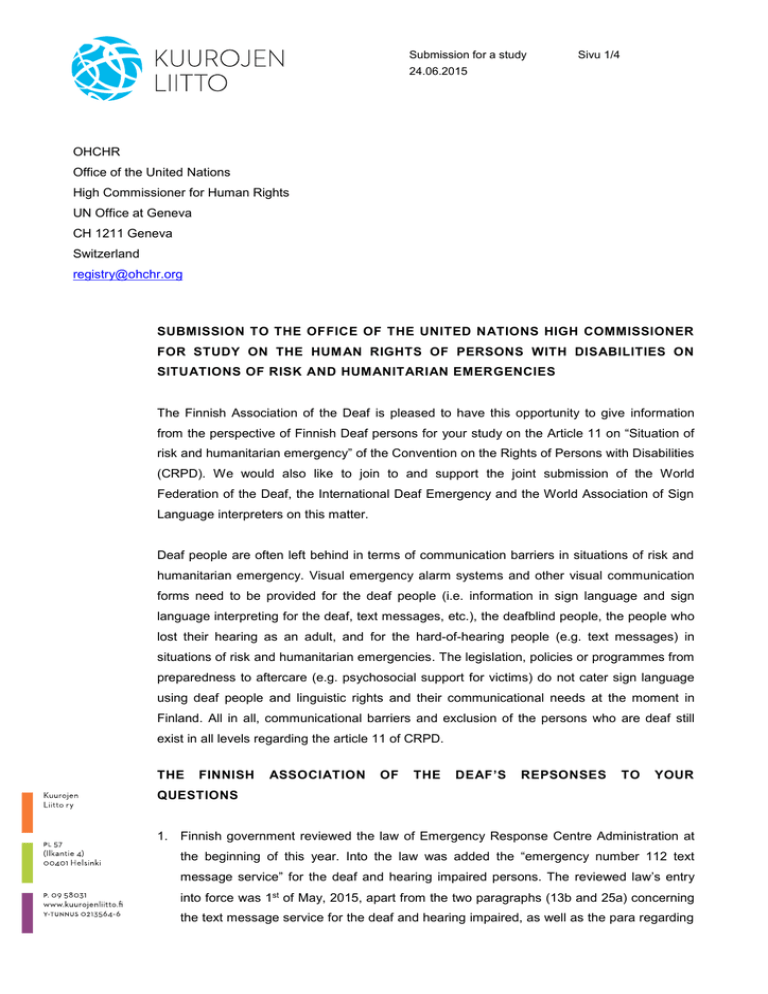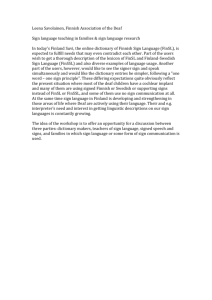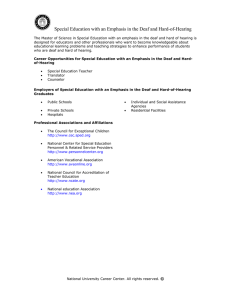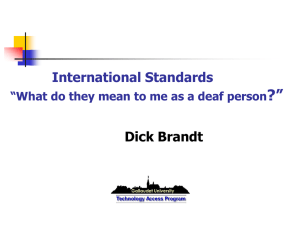Document 17702742
advertisement

Submission for a study Sivu 1/4 24.06.2015 OHCHR Office of the United Nations High Commissioner for Human Rights UN Office at Geneva CH 1211 Geneva Switzerland registry@ohchr.org SUBMISSION TO THE OFFICE OF THE UNITED NATIONS HIGH COMMISSIONER FOR STUDY ON THE HUM AN RIGHTS OF PERSONS WITH DISABILITIES ON SITUATIONS OF RISK AND HUMANITARIAN EMERGENCIES The Finnish Association of the Deaf is pleased to have this opportunity to give information from the perspective of Finnish Deaf persons for your study on the Article 11 on “Situation of risk and humanitarian emergency” of the Convention on the Rights of Persons with Disabilities (CRPD). We would also like to join to and support the joint submission of the World Federation of the Deaf, the International Deaf Emergency and the World Association of Sign Language interpreters on this matter. Deaf people are often left behind in terms of communication barriers in situations of risk and humanitarian emergency. Visual emergency alarm systems and other visual communication forms need to be provided for the deaf people (i.e. information in sign language and sign language interpreting for the deaf, text messages, etc.), the deafblind people, the people who lost their hearing as an adult, and for the hard-of-hearing people (e.g. text messages) in situations of risk and humanitarian emergencies. The legislation, policies or programmes from preparedness to aftercare (e.g. psychosocial support for victims) do not cater sign language using deaf people and linguistic rights and their communicational needs at the moment in Finland. All in all, communicational barriers and exclusion of the persons who are deaf still exist in all levels regarding the article 11 of CRPD. THE FINNISH ASSOCIATION OF THE DEAF’S REPSONSES TO YOUR QUESTIONS 1. Finnish government reviewed the law of Emergency Response Centre Administration at the beginning of this year. Into the law was added the “emergency number 112 text message service” for the deaf and hearing impaired persons. The reviewed law’s entry into force was 1st of May, 2015, apart from the two paragraphs (13b and 25a) concerning the text message service for the deaf and hearing impaired, as well as the para regarding Submission for a study Sivu 2/4 24.06.2015 a user register for that. Both paras will come into force only after the ERCA has a data system that supports emergency text messages, which at the moment seems to take place at the earliest at the end of 2016. The law also contains a user register, which means that the deaf and hearing impaired people must pre-register themselves to ERCA as users of the emergency text message service. As for the wider humanitarian and risk reduction response system on situations of risk and humanitarian emergencies, deaf people have not been taken into consideration at any level in legislation, policies, and programmes or at the practical level. There are no preparedness training for deaf citizens in sign language, no accessible visual information services for the deaf e.g. when the general emergency alarm is on, or sign language interpreters at live coverages of emergency press conferences on TV. Finland has not yet finished the ratification process of the UNCRPD. Thus, we do not yet have practical level experience on monitoring and assessing the implementation of the obligations brought to the government by the convention. The new, revised NonDiscrimination Act (2015) embraces the persons with disability as stakeholders, unlike the previous version of the law. It defines that e.g. disability or language shall not be a reason for discrimination. The law also puts emphasis on authorities’ responsibility to participate and inform all on equal basis. At the moment there are no known on-going plans or reviewing on emergency related legislation, policies or planning that would explicitly mention the deaf persons and their needs. 2. A year or two ago Finnish Association of the Deaf, with other sister organisations, initiated negotiations with the Ministry of the Interior on how to cover the communication needs of the deaf and hearing impaired persons equally with other citizens in case of wider humanitarian emergencies and risks as well as regarding risk managements. After the initial meeting there has been no progress on this matter. We will continue to push for it, though, as the deaf people are equal citizens with the others with the same rights for protection by the government. Sign Language Act came into force on 1st May, 2015. It is a framework law that doesn’t contain any new rights or new responsibilities for the authorities. Although Sign Language Act being only a brief framework law, it is a tool to use in advocating the linguistic rights of the sign language using deaf people within the authorities. It emphasises the responsibility of authorities to cater for the communicational needs of this group, among others also in situations of risk and humanitarian emergencies. Submission for a study Sivu 3/4 24.06.2015 In 2003 The Ministry of the Interior launched a manual for the authorities on evacuation of population in the situations of risk and humanitarian emergencies. Ministry is now planning to update this manual, but nothing concrete has taken place yet in that direction. None of the emergency laws, policies, planning or training at the moment include people who are deaf, in situations of emergencies. The emergency services personnel rarely, if at all, have even the basic sign language skills or the knowledge how to communicate with the deaf people. 3. Though the ratification of the CRPD is still pending, it contains responsibility of awareness raising among the policy makers and authorities, as well as training them. The independent monitoring body of the CRPD, Human Rights Centre, is actively involved advocating and promoting the rights of the persons with disability as part of their mandate. They have included persons with disability in their agenda in all levels. Having said that, the topic of article 11 has not been much on discussion so far in any level or by any authority actor on this field. In Finland we don’t have any action plans or programmes that would ensure a human rights –based approach to the inclusion of the deaf as a target group in situations of risk and humanitarian emergencies. Usually persons with disability, and the deaf are not participated, integrated or included in context creation, programme specific action plans, etc. in awareness and capacity building training for policy makers, practitioners community-based workers. In addition to the need to train the authorities and other governmental actors, and raise their awareness on disability on situations of emergency and risk, persons with disability also need training. The websites of emergency authorities or services do not provide any information in sign language on emergency preparedness (training, drills and preemergency materials). All training and information materials, planning, policies etc. need to explicitly address and consult the persons with disability, and specifically cater for the communicational needs of the people who are deaf. 4. In Finland we have a National Human Rights Delegation as part of the Human Rights Centre. At the moment the executive director of the Finnish Association of the Deaf is a member of the delegation. The serving term is 4 years, the term is approximately halfway through now. A week ago a new Non-Discrimination and Equality Board was appointed, which also has members from the disability movement. Submission for a study Sivu 4/4 24.06.2015 In addition of these two bodies there is also the National Council on Disability VANE, a co-operative organ for authorities, disability organisations and organisations for relatives of disabled people. It closely follows the decision-making in the society, gives statements and promotes the real implementation of human rights of disabled people. The Council is working in close connection with the Finnish Ministry of Social Affairs and Health. 5. No. These kind of statistics and disaggregated data collection is not allowed by the national legislation. If more information is needed, we are at your disposal. Helsinki 24th June, 2015. Yours sincerely, Virpi Thurén Special Advisor Finnish Association of the Deaf virpi.thuren@kuurojenliitto.fi




